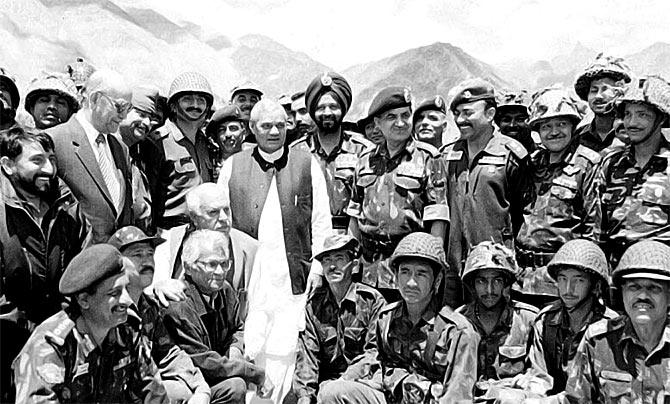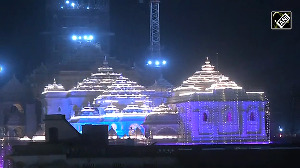'The Indian response in confining our action to our side of the LoC set a dangerous precedent,' argues Colonel Anil A Athale (retd).

As India observes the 20th anniversary of the brief but bloody Kargil conflict, it is time to have a long term view of the evolution of the Indian response to Pakistan's proxy war in Kashmir.
India obviously failed to inflict sufficient punishment on Pakistan for the transgression of the Line of Control. The talk in Pakistan of there being many more Kargils in the future is a pointer in that direction.
The Kargil intrusion was a classic case of attack by infiltration. The presence of regular Pakistani soldiers, the heavy weaponry with intruders and close support given by the Pakistani artillery, are all dead giveaways. The whole world therefore accepts that it was an attack by Pakistan on Indian territory.
The Indian response in confining our action to our side of the LoC set a dangerous precedent.
At any future date if Pakistan were to try an intrusion similarly, the world will expect India to observe similar restraint. This gave Pakistan the opportunity to bleed India to death.
India failed to extract a 'price' from Pakistan for its Kargil misadventure.
The price could be military in terms of loss of territory/soldiers/equipment or destruction of terrorist training infrastructure.
The economic cost could have been in terms of lost loans and grants while the psychological cost could have been in terms of humiliation at the international level.
Giving a 'face-saving' option to Pakistan, besides being a betrayal of the sacrifices of jawans, also proved disastrous for the future.
What Kargil has demonstrated, by the evidence from its own news media and other comments, is that Pakistan is quite capable of starting a war that it is bound to lose.
In this conflict, India that has adopted a policy of letting the opponent strike the first blow, is at a distinct disadvantage. It cannot afford to fall behind the technological race even for an instant.
The slogan 'There is no alternative to peace' lulled our thinking into inaction. The belief in Islamic ideology that supposes ultimate triumph is quite consistent with Pakistan's occasional withdrawal (as at Kargil) and the attempt to fill in every power vacuum though the activities of the ISI.
India has no choice but to develop a strategy of graduated employment of force that is technologically superior, causes disproportionate damage on the enemy and is still short of all-out war.
Here we enter the specifics of weapons development and their employment and as an active analyst, I would rather leave it at that. Whether this fresh approach is adopted or not will largely depend on the national political leadership in Delhi.
The Kargil misadventure was followed by Jaish e Mohammed's orchestrated attack on Parliament in December 2001. India mobilised its armed forces and moved them to the border, threatening an all-out conventional war.
The troops were finally withdrawn after an American-backed guarantee that Pakistan will not permit its territory to be used for attacks against India.
But no sooner had the threat to Pakistan reduced, it went back to its bad old ways. Terrorists based in Karachi mounted an attack on Mumbai on November 26, 2008.
Pakistani society is regressing into medievalism, has no stable State structure and is set to become the third most populous country in the world by 2050. It is already a net food importer and its population is growing at 5% per annum.
Along with the growth of fundamentalism and intolerance, it is likely to become a menace to not just India, but the entire world.
Much will depend on whether the world recognises this fact and takes action, or the support to India is confined to mere words.
It is time for the common man to understand the events related to the Pulwama terror incident and the subsequent counter strike by the Indian Air Force on the Balakot terror hub inside Pakistan (not Pakistan occupied Kashmir, but mainland Pakistan).
The reason to have an in-depth look at that event is that perennial opposition, scared of ceding ground to the BJP, tried to create a false narrative that emphasised the body count of terrorists and obscured the strategic aspect.
An interesting coincidence is that 20 years ago the Kargil conflict evoked similar negativity, also on the eve of elections.
I was part of a discussion in Pune where a former deputy home minister (no less), made the preposterous charge that the Kargil episode was 'engineered' by Atal Bihari Vajpayee, the then PM.
My counter to this bizarre charge, that the army had certain set procedures and document trail, right from the battalion to army headquarters and that it was impossible to engineer such an event, fell on deaf ears.
As in 2019, so in 1999, the BJP's rivals insulted the common sense intelligence of voters and paid the price.
The reason that the common citizen and not just security specialists need to understand the strategic issues involved is the often repeated adage, 'Wars (especially nuclear ones) are too serious a business to be left to generals alone'.
In a democracy, it is essential that the common citizen understands some aspects of national security.
Assured punitive action is at the heart of nuclear strategies, and India ignored this basic principle at its own peril.











 © 2025
© 2025